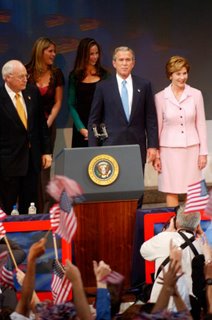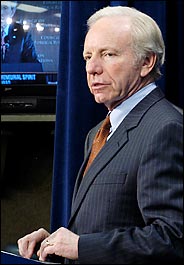
A few months back a colleague I discuss politics with chastised me in colorful language for even suggesting the possibility of impeachment. This was during the immediate aftermath of the Downing Street Memo. My point was that Bush clearly lied about the rationale for war and if the Democrats took back the House of Representatives, John Conyers would become the House Judiciary Chairman.
It was also John Conyers who took the lead in reporting on the electoral follies in Ohio last year, illustrating how George Bush once again prevailed illegitimately and illegally. I have no doubt that he has the steel and conviction to see impeachment through. Especially after the Judiciary Committee he serves on impeached President Clinton for lying about an extramarital affair under the leadership of counter culture reactionary, Congressman Henry Hyde.
My colleague proceeded to accuse me of living in a fantasy world for contemplating any impeachment scenario. Several months later we lived through Hurricane Katrina and President Bush brazenly boasted he authorized domestic surveillance without relying on court issued warrants through the FISA protocol. Katrina may turn out to be America’s Chernobyl and the new revelations about domestic surveillance have put George Bush on record for willfully disobeying the law. When combined with continued bloodshed in Iraq, new revelations from the Abramof scandal, and a looming health care crisis it’s not so far fetched that the Democrats just might recapture Congress in spite of their political ineptitude and impeachment is now openly discussed.
The bill of particulars against President Bush committing high crimes and misdemeanors is both substantial and credible:
- As former Nixon White House counsel John Dean noted in his book Worse Than Watergate, Bush's false statements about WMDs in Iraq--used to mobilize support for an invasion--deceived the American people and Congress. In 2004, Dean told PBS’s Bill Moyers, "I think the case is overwhelming that these people presented false information to the Congress and to the American people." Bush's actions were far worse than Watergate according to Dean because "no one died for Nixon's so-called Watergate abuses."
- The aforementioned Downing Street Memo revealed that Britain's MI-6 Director, Richard Dearlove told Tony Blair that "the intelligence and facts were being fixed around the policy" by the Bush Administration. John Bonifaz, a constitutional law expert, noted that Bush seemingly "concealed important intelligence which he ought to have communicated," and "must certainly be punished for giving false information to the Senate." Bush deceived "the American people as to the basis for taking the nation into war against Iraq," Bonifaz argued--an impeachable offense.
- Meanwhile, Professor Jonathan Turley of George Washington University School of Law--a specialist in surveillance law--told the on Charlotte Observer December 20th that “The President’s dead wrong. It’s not a close question. Federal law is clear. When the President admits that he violated constitutional law, that raises serious constitutional questions of high crimes and misdemeanors.” Furthermore, this represents a similar abuse of power that was part of the impeachment charge brought against Richard Nixon in 1974.
But a President Cheney will be difficult to dislodge or neutralize. Far from being a lame duck, a President Cheney will exploit the institutional powers of the White House to rally a divided Republican Party and hold onto power. The nomination would be his for the asking, as he would intimidate all sources of campaign financing not to support any rivals in the Republican Party. Meanwhile, the mainstream media as we have seen in recent years will probably assume a posture of subservience with only token critical reporting. They will go out of their way to help him rehabilitate his “Darth Vader” image. One can just imagine how reporters will describe a “new Cheney” just as the press lionized a “new Nixon” in 1968.
Ultimately, if a newly elected Congress were to impeach and remove President Bush it will put this country in greater peril. Whereas at least today we have a light at the end of the tunnel on January 20, 2009 - because whoever wins the Presidency in 2008 has to be more honorable and competent than George Bush. I therefore propose that the Democrats go after Vice President Cheney instead.
Vice President Cheney is the true power behind the throne anyway. Impeaching and removing him from office will serve multiple purposes: it will salvage and restore honor for America in the eyes of the civilized world as we stand up for the rule of law; the ring leader of the neo-cons will be disgraced and out of power; and a weakened President Bush will have to select a new Vice President that the Democrats approve of. Also, for all the lore about Bush’s fidelity to loyalty, there is already a distancing between Cheney and the Bush clan. Brent Scrowcroft would not tell the media that “I don’t know Dick Cheney anymore” without the permission of George Bush, Sr. George Bush might be relieved to be cut loose of Cheney. Cheney would have little choice but to take a bullet for the White House. Meanwhile, the symbolism of impeaching and removing Cheney would have considerable value while reaffirming constitutional principals about the rule of law. Future Presidents and Vice Presidents will remember the fate of a disgraced Dick Cheney.
Some out there might just wonder: why can’t we impeach both? It is doubtful that the body politic can absorb the impeachment and removal of a sitting President and Vice President no matter how justified. That would mean the Speaker of the House becomes President. While George Bush became President as the result of a legalistic coup in 2000, the entire political establishment would have a conniption fit at the prospect of Nancy Pelosi becoming President under such circumstances if the Democrats take the House of Representatives next year.
This is going to be a campaign issue in 2006. Liberal special interest groups will exploit the possibility of impeaching Bush to rally the party’s base. Meanwhile the Republicans will also rally their base by warning that an emboldened Democratic Congress will try to impeach President Bush. I maintain that Dick Cheney is the right target. Impeaching Bush is tantamount to indicting Kermit the Frog when everyone knows it’s really Ms. Piggie who wears the pants.






